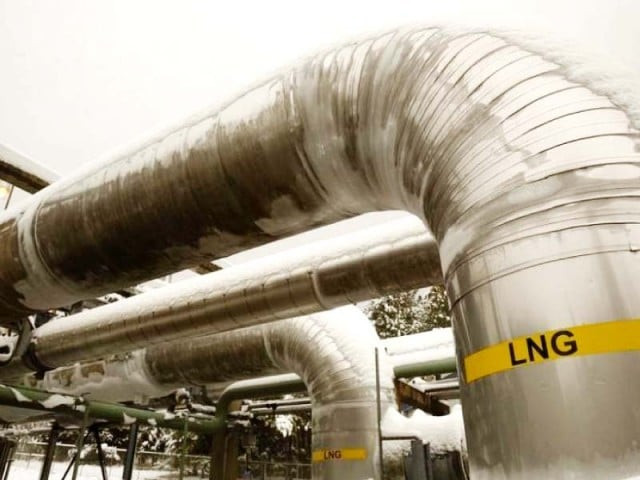Global consultant backed ETPL’s bid for LNG terminal
Termed company’s price proposal competitive for the fast-track project

The contract with Qatargas is for five cargoes per month whereas PLL’s contract with Eni is for one cargo per month.
PHOTO:FILE
In response to a petition filed in the Supreme Court, ISGS - a company set up by the government to handle gas import projects - said QED Consulting had also apprised that there was no condition attached to the ETPL’s price proposal.
The consultant explained that in order to provide with an independent analysis of ETPL’s price proposal, it had undertaken comparisons.
ISGS recalled that the Economic Coordination Committee (ECC) had decided that a process for complying with Public Procurement Regulatory Authority (PPRA) rules must be initiated and as a result ISGS invited tenders in September 2013 for the construction of an LNG terminal at Port Qasim with handling capacity of 3 million tons per annum.
Tender documents were prepared by independent consultant QED Consulting in association with the stakeholders concerned including the Ministry of Energy (Petroleum Division), Sui Southern Gas Company (SSGC) and ISGS.
According to the tender, the bidders were required to construct the terminal in 11 months.
The scope of work included construction of a much larger berth to handle big vessels, extensive capital-intensive dredging of a greenfield berthing basin and a 24-kilometre pipeline network comprising high-pressure pipelines connected to the SSGC system.
Previously, tenders had been invited on an integrated basis meaning bidders were responsible for both terminal development as well as LNG import. However, on account of continuous unsuccessful attempts, this time only the tolling concept was adopted for the import of much-needed energy.
Based on price comparisons, QED Consulting concluded, “ETPL’s proposal lies within the range of QED’s bottom-up analysis and below the range for other categories. If a new FSRU (floating storage and re-gasification unit) is provided, at higher cost, we will expect ETPL’s price to be within the benchmark range of each of the other categories.
PSO stops fuel oil imports, awaits demand from power producers
“Whilst there are differences between the various comparison projects used, this analysis provides an acceptable level of confidence that the price proposal submitted by ETPL for the fast-track project is competitive.”
Prices of LNG imported by Pakistan LNG Limited since 2017 range between 11.3014% and 16.2500% of Brent crude rate. However, international LNG prices continue to change depending on market dynamics such as supply-and-demand situation, buyer’s credit rating and other relevant factors.
The comparison of LNG price for a contract with Qatargas and the price offered by Italy’s Eni to Pakistan LNG in 2017 was out of place and was not an apple-to-apple comparison, the consultant said.
The contract with Qatargas is for five cargoes per month whereas PLL’s contract with Eni is for one cargo per month.
The consultant pointed out that a natural disaster in an LNG-producing country or a large LNG-importing country could turn the spot market upside down and could make access not just expensive but at times very tough.
Third LNG-based power plant completed
For instance, following the Fukushima nuclear disaster, the spot LNG price in East Asia touched $18 per million British thermal units (mmbtu) from just under $10 before the incident.
A review of the spot market reveals that China’s recent policy shift leading to an aggressive growth in LNG imports due to environmental concerns has pushed up spot prices in the region.
In the first five months of 2018, China surpassed Japan as the world’s largest natural gas buyer.
Interest from a large buyer like China, Japan or South Korea, which account for more than 55% of world’s LNG imports, does not only affect prices, but also reduces the interest of traders in supplying to other markets.
Published in The Express Tribune, July 17th, 2018.
Like Business on Facebook, follow @TribuneBiz on Twitter to stay informed and join in the conversation.


















COMMENTS
Comments are moderated and generally will be posted if they are on-topic and not abusive.
For more information, please see our Comments FAQ